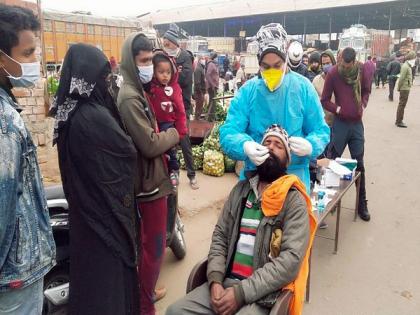TIGS Director calls for exercising restraint before declaring COVID-19 'endemic', says a lot depends on future variants
By ANI | Published: March 12, 2022 05:58 PM2022-03-12T17:58:23+5:302022-03-12T18:05:02+5:30
As the COVID third wave has faded in the country, the Director of Tata Institute for Genetics and Society (TIGS), Bengaluru has called upon people not to be complacent and said one should still have to wait to declare COVID-19 an "endemic" asserting that a lot depends on the situations due to future variants of COVID.

TIGS Director calls for exercising restraint before declaring COVID-19 'endemic', says a lot depends on future variants
As the COVID third wave has faded in the country, the Director of Tata Institute for Genetics and Society (TIGS), Bengaluru has called upon people not to be complacent and said one should still have to wait to declare COVID-19 an "endemic" asserting that a lot depends on the situations due to future variants of COVID.
Director of Tata Institute for Genetics and Society (TIGS), Bengaluru, Dr Rakesh Mishra, in an exclusive interview toon Saturday, COVID infection rate is low at present but warned of the threat of a new COVID variant which a combination of Omicron and Delta.
"Using certain criteria you can say now there is a very low infection rate. You can call it endemic, but I think still one has to wait because you remember between the second wave and third wave, there was a situation like this. Even there were many people who were avoiding taking even the second dose of vaccine. So, I think we are in a good position. But this does not mean that we should expand at this advantage," he said.
Explaining the process that would take place in case COVID-19 is declared an endemic, Dr Mishra further said, "WHO meets every three months to discuss what is the status and whether they can call the pandemic is over. I think a lot depends on future variant situations and there are things to be convinced that will not be in more difficulties. But there are also reasons to keep in mind that things can go more difficult sometimes."
As World Health Organization (WHO) warns of a variant which a combination of Omicron and Delta based on some study, the TIGS Director pointed out that it is very difficult to imagine how the recombinant virus of this kind can come up and added it needs more careful study.
"But if not the real recombinant virus, even Omicron is sufficiently potent. And if some mutations by chance come which we can make it more clinical, clinically antibodies some that itself will be a big problem."
"Maybe delta variant is already gone and it is largely Omicron most of the places so that also reduces the chance of recombining. But both things have to be reasonably comparable numbers to get a chance that the same person has both infections. It is largely Omicron because everybody's getting infected. So it is closed 99 per cent of most places, so the recombinant has not so much a problem but by itself, the virus has been changing," he added.
An epidemic describes an infectious disease outbreak that is spreading in a region or population while a pandemic affects people throughout a large region or across multiple continents.
Dr Mishra said that Omicron is sufficiently potent in terms of evading the immune system or vaccine breakthrough. "So there are advantages but we can't declare that we are done with this pandemic."
As last year a sudden spike in COVID cases was reported after huge gatherings during the Holi festival, Dr Mishra stressed taking all precautions to be protected from the virus.
"It is extremely important that not expose ourselves and lose the advantage that we have at the moment and taking advantage of the situation is that wear masks, avoid unnecessary clustering."
He urged people to get vaccinated against COVID-19. "If somebody has not got either of those. They should get that. And when the younger people are getting options, they should get vaccinated. These are the things we should actively do," he added.
Dr Mishra also suggested environmental surveillance as an indicator for the virus. "But there is environmental surveillance like this water surveillance and those things we can put firmly in place and that will be a very good indicator."
He further explained how the COVID-19 virus is infecting many species and then again jumping back into humans. "This virus is known to go to many other species, many other mammals there are, I think 15-20 species where it is shown to go and infected and maybe half of them can infect us back. So, they have to keep that also in mind that the virus may be using some other species as a reservoir."
He also pointed out the need for steps to be taken to ensure that coronavirus doesn't transmit from animals to humans.
( With inputs from ANI )
Disclaimer: This post has been auto-published from an agency feed without any modifications to the text and has not been reviewed by an editor
Open in app